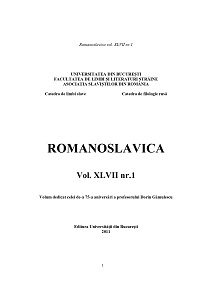Dominantne manjinske kulture i pitanje međukulturne komunikacije
Dominant minority cultures and the question of intercultural communication
Author(s): Mariana Dan, Minerva Trajoviš-KondanSubject(s): Language studies, Sociolinguistics, Romanian Literature, Serbian Literature, Cultural Anthropology / Ethnology, 18th Century, 19th Century, History of Communism, Ethnic Minorities Studies
Published by: Editura Universităţii din Bucureşti
Keywords: regional or minority languages; cross-cultural communication; reception; dominant language and culture; bilingualism; Romanian ethnic minority; Wallach language and culture; communism; ex-Yugoslavia;
Summary/Abstract: Language and culture are, on the one hand, important factors in identity formation and expression, but they might be as well, on the other hand, tools for political manipulation. Since the end of the 18th and during the 19th century, in Europe, different dominant nations tried to impose a unique language, literature and cultural curriculum in education, neglecting thus the minority and/or regional languages and cultures. The socio-political relation between dominant and non-dominant languages and cultures has nowadays resulted in the mere extinction of the non-dominant entities. The European Charter for Regional or Minority Languages (ECRML) is a European treaty adopted in 1992 under the auspices of the Council of Europe and is meant to protect and promote historical regional and minority languages in Europe. The charter provides a large number of different actions state parties can take to protect and promote historical regional and minority languages. Enlightening, diachronically, the position of the Romanian ethnic minority language and literature in Serbia, as paralleled to the Wallach one, this paper analyses the cultural, and not the political aspects of this chart from a socio-linguistic and literary perspective. While stating that nowadays minority languages and cultures are anyway vanishing to different extends, it is, however, obvious that minority cultures that are backed up by official institutions are more sustainable, due to cross-cultural communication. Bilingualism, as a solution is discussed in terms of education; on the contrary, communities die away, if kept in cultural and linguistic enclaves with no education in both dominant and minority language. The paper also discusses the positive minority language and culture model of Voivodina in contrast to the situation of the Wallach culture which, although ancient and rich, has no writing and lacks in auctorial literary works, and which is, consequently, vanishing away without the involvement of local and regional government. The dichotomy language and/or culture is also discussed in terms of history and Weltanschauung. The communist regime of the ex-Yugoslavia was not less democratic, in respect to minority and regional languages, than any other European nation until the second half of the 20th century, as it has promoted the philosophy of culture as an identity programme meant to keep the nation together. Since 1989, science has proved that values in cultures cannot be imposed from the outside, as ‗transcendental‘, as a commonly acceptable philosophy, but it is the individual who creates and expresses the values, no matter if the individual belongs to a minority language and culture or not. That is why, in the postmodern democratic society the philosophy of culture, which is actually viewed as the socio-political ideology of a nation, has been replaced with an anthropological concept, which does not establish any aprioristic or nationalistic views; on the contrary, cultural values are founded by man as an individual who has the right to express himself. However, dominant languages and cultures still exist and, in the end, if valuable authors shift to another language, as they did in the past, in order to achieve better cross-cultural communication, it is less important how we pronounce their names, for example; for culture, as separated from the socio-political and ideological burdens of the philosophy of culture, the fact is important that a certain author has produced cultural values. Anonymous culture is unacceptable today. This is one more reason for the European countries to accept the European Charter for Regional or Minority Language, while the author should have the possibility to freely choose the language in which he writes.
Journal: Romanoslavica
- Issue Year: XLVII/2011
- Issue No: 1
- Page Range: 223-234
- Page Count: 12
- Language: Serbian

